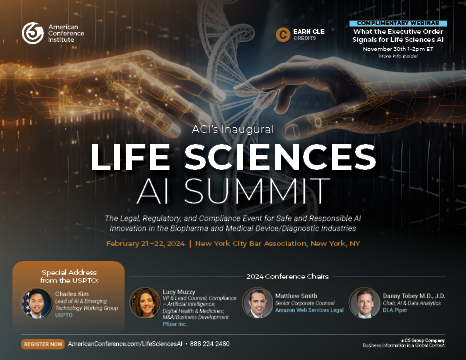Agenda

Flip through our conference brochure and discover what’s new this year.
Download Brochure
Day 1
February 21, 2024
Breakfast and Registration

Bill GearyCo-Founder and PartnerFlare Capital Partners

Danny Tobey M.D., J.D.Chair, AI & Data AnalyticsDLA Piper
How do we get there from here? For years, technology has promised a new era of precision medicine, accelerated drug design and approval, interoperability and a less fragmented healthcare system. Recent advances in AI bring a renewed hope that we will get closer faster. But what stands in the way? How can law and politics help? What should players across the healthcare and life science value chain contribute? Learn from a conversation with Bill Geary, Co-Founder of Flare Capital Partners and Advisory Council member of the Department of Biomedical Informatics of Harvard Medical School, moderated by Danny Tobey, MD JD, co-chair of the conference and Financial Times 2023 Innovative Lawyer of North America.
Traversing AI's Legislative and Regulatory Landscape in the Life Sciences

Miranda ColePartnerNorton Rose Fullbright, LLP

Alexander KorenbergPartnerKilburn & Strode LLP

Matthew SmithSenior Corporate CounselAmazon Web Services Legal
- Comparing and highlighting major contrasts and parallels between the US and EU legislative approaches towards AI in the life sciences
- Exploring recent and anticipated legislative developments related to AI in the life sciences
- US Legislation in focus:
- The Algorithmic Accountability Act of 2022 and the implications for the life sciences
- Proposed legislative measures concerning AI biases and their impact on decision-making
- EU’s AI Act:
- Analyzing the potential influence on life sciences, from drug discovery to patient care
- Proposed provisions specifically targeting health-related AI applications
- US Legislation in focus:
- Legislative preparedness
- Strategies for life sciences companies and their counsel to ensure compliance and proactive adaptation

James BoianiShareholderEpstein Becker & Green, P.C.

Philip DesjardinsPartnerArnold & Porter(Former Associate Director for Policy, FDA Center for Devices and Radiological Health)

Donielle JohnsonFormer VP Global Regulatory AffairsBausch + Lomb

Hannah RosenfeldDigital Health SpecialistFDA
- Understanding the importance of the FDA and EMA in guiding AI’s trajectory in the life sciences
- FDA’s regulatory framework for AI
- Examining FDA’s approach to AI-based medical devices and AI algorithms
- Predetermined Change Control Plans (PCCPs)
- Reviewing FDA’s guidance on clinical decision support software
- Understanding how FDA view and categorizes AI-driven medical solutions
- Examining FDA’s approach to AI-based medical devices and AI algorithms
- Appreciating EMA’s position on AI:
- Exploring EMA’s stance on integrating AI into drug development and patient care
- Clarifying EMA’s criteria for AI-driven medical applications and their alignment with EU’s AI Act
- Identifying areas of alignment and disparity between FDA and EMA directives
- Offering insights on effective strategies for regulatory compliance and proactive engagement with these agencies
Morning Networking Break
Generative AI in the Life Sciences: An Analysis of Opportunities, Challenges, and Risks for Market Expansion and New Product

Daniel J. BarskyPartnerHolland & Knight

Emily GardelAssociate Director, Patent Attorney IIDyno Therapeutics

Michael P. KahnPartnerAkin Gump Strauss Hauer & Feld LLP

Lucy MuzzyVP, Compliance – M&A/Business Development
Government Agreements; Artificial IntelligencePfizer
Generative AI creates new data models or simulations based on existing data, enabling the generation of novel drug compounds or biological structures. Traditional AI, on the other hand, primarily analyzes and interprets existing data, such as predicting drug interactions or diagnosing conditions based on provided inputs.
This panel will shed light on the world of generative AI, outlining its transformative capabilities and the associated legal, ethical, and business implications in the life sciences.
- Understanding how generative AI differs from traditional AI models and its specific applications in the life sciences
- Identifying market expansion opportunities
- Spotting the areas within the life sciences that stand to benefit the most from generative AI innovations
- Drug discovery and design
- Synthetic biology
- Medical imaging
- Disease modeling
- Personalized medicine
- Natural language generation for clinical data
- Data augmentation in genomics
- Spotting the areas within the life sciences that stand to benefit the most from generative AI innovations
- Addressing legal and ethical impediments
- Preparing for the potential IP challenges
Networking Luncheon
The Power of AI in Drug Discovery and Medical Device/Diagnostic Advancement: Preparing for Potential Legal Liabilities

Benjamin HsingPartnerVenable LLP

Lora SpencerPrincipal Global Litigation & Investigations CounselMedtronic
- Understanding how AI is revolutionizing drug discovery and the advancement of medical devices/diagnostics
- Identifying the areas where legal liabilities will arise in AI-driven drug and device development
- Innovation and IP
- Quality control and assurance
- Data integrity and privacy
- Accountability and transparency
- Regulatory approvals
- Best practices for life sciences companies to minimize legal risks and remain compliant
IP Protections and AI Inventions in the Life Sciences: Exploring Complexities in Inventorship and Ownership

Chris MammenPartnerWomble Bond Dickinson (US) LLP

Rama G. ElluruSenior DirectorSpecial Competitive Studies Project – SCSP

Corey SalsbergVice President, Global Head IP AffairsNovartis

Hans SauerDeputy General Counsel, VP for IPBiotechnology Industry Organization (BIO)
- Untangling AI’s impact on intellectual property in the life sciences industry
- Assessing the patentability of AI-driven innovations and understanding the limits of IP protection for these inventions
- Evaluating IP protections when AI is utilized as part of the inventive/creative process
- Determining ownership rights when AI contributes to or independently creates solutions
- Exploring joint ownership scenarios and their licensing ramifications
- Assessing infringement risks of existing IP when used for AI training, selection, or generation
- Comparing the complexities of AI-generated inventions, data ownership, and copyright infringement
- Distinguishing between proprietary data used for training and AI-generated datasets
- Understanding the scope and risks when AI reproduces or builds upon copyrighted materials
- Evaluating fair use defenses
- Anticipating and mitigating liabilities arising from AI-induced copyright breaches
Afternoon Networking Break

Maureen BennettPartnerJones Day

Luis VilarinVice President, Associate General Counsel, Patient, Data & Privacy LawBristol Myers Squibb

Charlene ChoDirector and Corporate Counsel, Digital and Technology LawThermo Fisher Scientific
- Safeguarding how AI enhances clinical trial design, patient recruitment, and outcome prediction
- Addressing potential biases and ethical considerations in AI-driven recruitment strategies
- Incorporating the FDA’s guidance on Clinical Decision Support Software and its impact on trial optimization
- Understanding FDA’s stance on Clinical Decision Support Software and the impact on clinical trials
- Underscoring how AI can ensure data consistency, mitigate data errors, and streamline data collection
- Contemplating the legal and ethical aspects of AI-driven patient engagement strategies
- Considering the legal implications of AI-generated post-trial analyses and their acceptability in regulatory submissions

Avi GesserPartnerDebevoise & Plimpton LLP

Betsy GreytokVice President & Associate General Counsel, Foundational ModelsIBM
- Delving into the challenge of AI bias in the life sciences
- Evaluating sources of bias in AI from data collection to algorithmic design
- Addressing AI bias in:
- Drug development
- Clinical trials
- AI-powered diagnosis
- Taking stock of the EU’s proposed AI Act and its relevance to fairness and accountability
- Understanding the key components of the proposed Act
- Reviewing ethical considerations related to AI in life sciences
- Examining real-world dilemmas where AI’s decisions challenge traditional ethics
- Discussing fairness, transparency, and accountability in AI-driven decisions
- Exploring tools and techniques to enhance fairness in AI models, from diversifying data sources to clarifying model reasoning
Closing Remarks from Chairs
Cocktail Reception Sponsored by 
Day 2
February 22, 2024
Breakfast
Assessing the Full Spectrum of AI Litigation in Life Sciences: Evaluating Potential and Inevitable Legal Risks from Pre-Commercialization to Post-Commercialization

Anna GresselCounselPaul Weiss

Aleksander J. GoraninPartnerDuane Morris LLP
As AI integrates into every facet of the life sciences, from pre-commercialization R&D efforts to post-commercialization patient care, the legal landscape grows equally complex. This session will prepare you for the potential legal challenges awaiting life sciences companies. Topics of discussion will include:
- Reconciling who is at fault when AI errors occur from a product liability standpoint
- Navigating the blurred lines of AI-generated content and proprietary algorithms
- Mitigating risks in an age of heightened sensitivity to patient data misuse
- Bulletproofing agreements and collaborations centered on AI
- Preparing for the unseen antitrust pitfalls of AI’s predictive capabilities in pricing and treatment paradigms

Corey M. DennisSenior Director, Counsel – Information Security & PrivacyEli Lilly and Company

Erin GeyganSenior Counsel Privacy (MedTech), Data Protection Legal
Global Legal OrganizationJohnson & Johnson

Christine MoundasPartnerRopes & Gray LLP

Daniel FisherDirector, Digital & DataMerck
- Understanding the intersection of AI and the life sciences, focusing on data privacy and security
- Assessing the inherent risks and rewards associated with using vast datasets in AI-driven innovations
- Addressing GDPR’s implications for healthcare organizations utilizing AI-powered systems
- Exploring data rights, breach notifications, and the role of Data Protection Officers
- Strategizing for ensuring data protection while complying with HIPAA requirements
- Understanding how HIPAA’s Privacy and Security Rules interact with evolving AI tech in the life sciences
- Securing data anonymization
- Evaluating techniques and technologies to anonymize sensitive data
- Harmonizing AI ethics and bias mitigation
- Preserving patient data, protection, and consent

Jeremy BondLeader of Digital & Device Patents, US Patent AnalyticsSanofi

Sheea SybblisAssociate General Counsel & Practice Group LeaderGenentech

RuiHui (Rachel) YuPartnerSullivan & Cromwell LLP
- Considering AI partnerships, collaboration models, and business strategies that bridge the gap between research and clinical implementation
- Grasping the nuances of AI collaborations, from data sharing to model deployment
- Identifying common pitfalls and challenges in AI partnerships
- Recognizing and resolving potential disconnects in goals and expectations
- Creating collaborative agreements that prioritize safety, data security, and ethical AI applications
- Evaluating strategies for integration of AI solutions post-collaboration
- Addressing technical challenges arising from integrating different AI systems
Networking Luncheon

Mark Sendak, MD, MPPClinical Data ScientistDuke Institute for Health Innovation

Sam Tyner-Monroe, Ph.DManaging Director of Responsible AIDLA Piper

Nick MerkerAssociate Vice President
Assistant General Counsel, AI, Information Security and PrivacyEli Lilly and Company
Nearly every proposed regulation and law emphasizes the importance of testing artificial intelligence, but what does AI testing mean in the context of the life sciences and healthcare? What is the benchmark for patient and HCP-facing AI? How do the expectations of FDA, HHS, NIST, and other regulators differ? And how does all of this apply to multipurpose generative AI? Learn from the leading practitioners in the field at the intersection of law and data science.
Spotlight on Where AI in Life Sciences and Healthcare Intersect

Rekha HanuSenior IP Strategy Counsel, Patient Care SolutionsGE Healthcare

Kelliann H. PaynePartnerHogan Lovells US LLP

Michele Suggs AdeleyeVice President, Assistant General Counsel, Digital ImplementationPfizer
- Examining how AI-powered patient monitoring is revolutionizing remote healthcare
- Understanding AI’s capacity in wearables, predictive analytics, and personalized patient care
- Addressing concerns about AI in patient data management and regulatory requirements
- Understanding AI and ML in software as a medical device (SaMD)
- Decoding FDA’s evolving stance on AI-integrated SaMDs
- Considering the ethical and regulatory implications of AI’s ever-improving diagnostic capabilities
Afternoon Networking Break

Eva F. YinPartnerWilson Sonsini

Marisa FayerCEODeepLook Medical

Rachel TornheimHead of Consumer Digital InnovationsMount Sinai Health System
- Exploring how AI assists healthcare providers in making informed treatment decisions
- Addressing FDA’s oversight of clinical decision support software and its implications for patient care
- Evaluating the post-market surveillance and modifications of AI-powered clinical decision support (CDS) tools
- Controlling disease diagnosis and medical imaging
- Harnessing Ai in enhancing the accuracy, speed, and consistency of medical imaging interpretation
- Defining the challenges and opportunities of implementing AI in radiology and pathology
- Discussing the transformative impact of AI on precision medicine and targeted treatments
- Balancing data privacy concerns with the need for comprehensive datasets to train and refine these types of AI models

